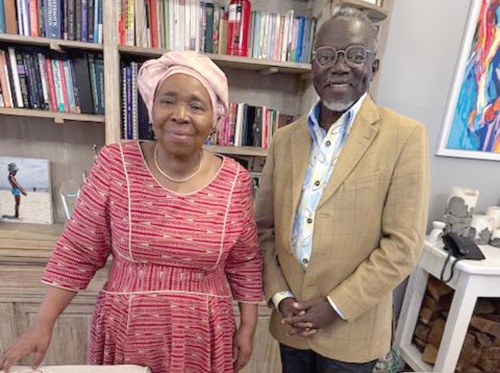Two African technocrats have urged African leaders to tackle the simple issues of jobs, infrastructure and technology to revive hope among the African youth for a better future.
Former African Union Chairperson, Dr Nkosazana Dlamini-Zuma, and industrialisation strategist and author, Professor Douglas Boateng, said the solutions to the issues that bedevil Africa were within the continent and well within the reach of its leaders.
They advocated, for instance, investment into factories to create the employment spaces for the youth of the continent.
The two experts made the observation during a strategy meeting between them in Johannesburg.
The pair are widely considered two of the continent’s most influential minds in strategic thinking.
Dr Dlamini-Zuma is credited as the architect of the African Union’s Agenda 2063 project, while Prof. Boateng is a globally recognised chartered engineer, a thought leading boardroom governance advocate, and social entrepreneur.
“Agenda 2063 was never about paper,” Dr Dlamini-Zuma said. “It was and remains about purpose; about giving our grandchildren a functioning continent, not a deferred dream,” she added.
The dialogue pulled no punches on Africa’s quietest crisis, namely the abandonment of rural economies.
“Our youth are not fleeing their homes. They are fleeing hopelessness. If we take roads, factories, and innovation to them, they will stay. They will build,” Dr Dlamini-Zuma said.
“Neglecting the rural majority is not merely a policy failure; it is a betrayal of promise,” she added.
The discussion also featured the African Continental Free Trade Area (AfCFTA), its impact on the development of the continent, how the continent could leverage the initiative to achieve ultimate development, Agenda 2063 and the United Nations Sustainable Development Goals (SDGs).
Dr Dlamini-Zuma said AfCFTA, Agenda 2063, and the UN SDGs must not be viewed as silos, insisting that they were complementary instruments of one African purpose.
“AfCFTA must become more than a treaty,” she said, adding that “it must be the artery through which African productivity flows.”
“The Africa We Want is not a slogan,” she reaffirmed.
“It is a daily decision, one that must be made across ministries, boardrooms, farms, homes and schools.”
“Development is not a theory,” echoed Boateng. “It is logistics. It is ports. It is accountability.
These frameworks are not decorative; they are tools. And tools must be used.
Prof. Boateng diagnosed Africa’s problems to include the failure to add value to its vast natural resource base, and instead boosting foreign economies through African imports.
“We import what we can produce.
We export what we should refine. It is poetic.
And it is painful,” he said, with his co-discussant remarking: “And tragically, it is preventable”. added Dr. Dlamini-Zuma.
“Every unbuilt factory is a missed future. Africa does not need pity.
It needs purposeful production.
The continent must stop trading excuses for progress.
The time for ‘we will’ must give way to ‘we are’,” Prof. Boateng said.
“Leadership is not about titles or applause.
It is about foresight, about planting trees under whose shade we may never sit,” he said.
True leadership, both experts agreed, must be defined by the courage to prepare for those yet unborn, not the convenience of short-term applause.

